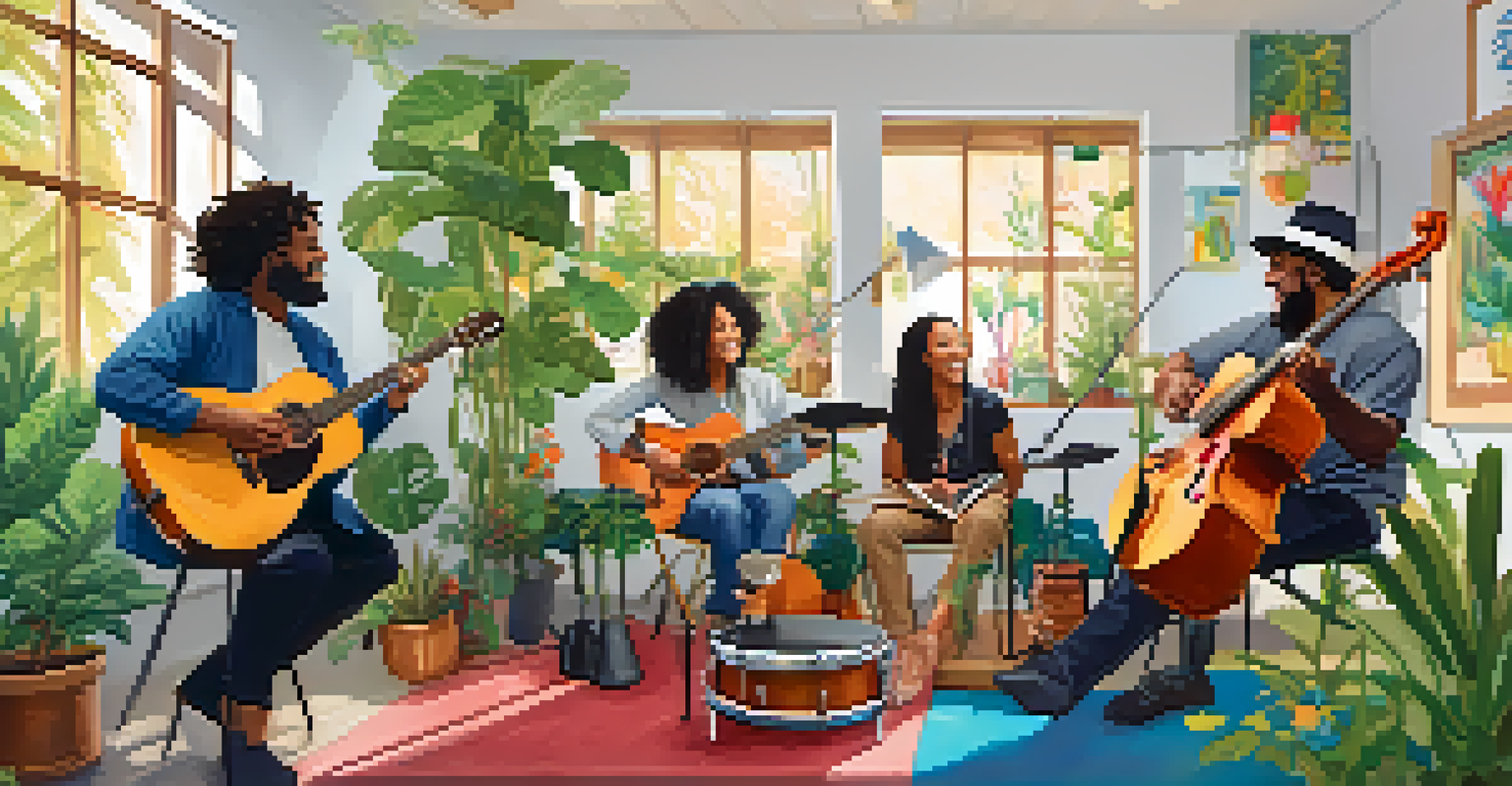The Psychology of Music: Why We Connect Emotionally

Music's Role in Human Emotion and Connection
Music has a unique ability to evoke emotions, often tapping into our most profound feelings. From the joy of a catchy tune to the melancholy of a slow ballad, music can mirror our emotional states. This connection isn't just personal; it’s universal, as people across cultures and backgrounds find solace and expression through music.
Music can change the world because it can change people.
Studies show that when we listen to music, our brains release dopamine, the 'feel-good' neurotransmitter. This chemical reaction can create feelings of pleasure and happiness, reinforcing our bond with certain songs or genres. Every time we hit play on a favorite track, we’re not just enjoying a melody; we’re engaging in a powerful emotional experience.
Additionally, music often serves as a soundtrack to our lives, marking significant moments—from weddings to graduations. These associations deepen our emotional responses, as we relate specific songs to personal memories. Thus, music becomes a vital thread in the fabric of our emotional experiences, enhancing our connections to ourselves and others.
The Science Behind Our Emotional Responses to Music
The psychology of music delves into how our brains process sound and emotion. Research suggests that music activates various regions of the brain, including those linked to emotion and memory. This interplay explains why a single song can transport us back to a moment in time, evoking vivid memories and feelings.

Moreover, the structure of music—its rhythm, melody, and harmony—can influence our mood. Fast tempos might energize us, while slower melodies can evoke contemplation or sadness. This intentional design allows composers and artists to evoke specific emotional responses, making music a powerful tool for storytelling.
Music evokes deep emotional responses
Music has the power to elicit a wide range of emotions, connecting us to our feelings and memories.
Understanding our emotional reactions to music can also provide insights into our psychological state. For instance, someone might gravitate toward uplifting tunes during challenging times, seeking comfort and motivation. This adaptive quality of music highlights its importance in our emotional well-being.
Cultural Variations in Music and Emotional Expression
Music is deeply rooted in culture, and different societies express emotions through distinct musical styles. For example, the blues genre originated in African American communities to articulate feelings of sorrow and resilience. This cultural context shapes how we interpret music and its emotional significance.
Where words fail, music speaks.
Moreover, traditional music often reflects the values and experiences of a community, offering insights into their emotional landscape. For instance, celebratory music during festivals can amplify feelings of joy and unity, while mournful tunes during funerals provide a space for grief and reflection. This cultural lens enriches our understanding of music’s emotional impact.
As globalization spreads music across borders, we find ourselves connecting with sounds and emotions from around the world. The fusion of different musical styles allows us to experience a broader range of emotions, fostering empathy and understanding. In this way, music serves as a bridge between cultures, deepening our emotional connections globally.
The Therapeutic Power of Music in Healing
Music therapy is an increasingly recognized field that harnesses the emotional power of music for healing purposes. It can help individuals cope with mental health issues, physical ailments, and emotional distress. By using music as a therapeutic tool, professionals can facilitate emotional expression and promote healing.
Through guided sessions, music therapists create personalized experiences that encourage patients to explore their feelings. Whether through listening, songwriting, or playing instruments, these activities can provide a safe outlet for emotions, aiding in self-discovery and growth. The act of creating or engaging with music can lead to profound emotional breakthroughs.
Cultural influences shape musical expression
Different societies express emotions through unique musical styles, enriching our understanding of music's emotional impact.
Furthermore, research indicates that music therapy can reduce anxiety, improve mood, and even enhance cognitive function. As we tap into music's emotional resonance, we can harness its power to foster healing and resilience, showcasing the profound connection between music and our emotional well-being.
Shared Musical Experiences and Social Bonds
Sharing music can create strong social bonds, whether through concerts, festivals, or simply sharing playlists with friends. These shared experiences foster a sense of community, as people come together to celebrate, mourn, or connect through music. This collective emotional engagement deepens relationships and creates lasting memories.
When we listen to music with others, we often synchronize our emotional responses, amplifying our feelings of joy, excitement, or even sadness. This phenomenon, known as emotional contagion, highlights how music can enhance our social interactions. It’s not just about the notes; it’s about the connections we forge through shared experiences.
Furthermore, participating in group music-making activities, like choirs or bands, can strengthen social ties. These collaborative experiences promote teamwork and empathy, as individuals work together to create harmony. Thus, music not only enriches our personal lives but also plays a vital role in building and maintaining our social networks.
The Future of Music and Emotional Connection
As technology continues to evolve, so does our relationship with music. Streaming services offer personalized playlists that cater to our emotional states, making it easier to find the perfect soundtrack for any moment. This accessibility allows us to explore diverse genres and artists, enhancing our emotional experiences.
Moreover, advancements in artificial intelligence are paving the way for innovative music creation. AI-generated music can adapt to our emotions in real-time, providing a unique listening experience tailored to our needs. This fusion of technology and creativity opens up new avenues for emotional connection through music.
Music therapy aids emotional healing
Utilizing music in therapeutic settings can facilitate emotional expression and promote healing for individuals facing various challenges.
However, as we embrace these technological advancements, it’s essential to remain mindful of the authenticity that music brings to our lives. While algorithms and AI can enhance our experiences, nothing can replace the raw emotion and connection we feel when we engage with music in its most genuine form.
Conclusion: Embracing Music's Emotional Impact
In conclusion, the psychology of music reveals just how deeply intertwined our emotions and musical experiences are. From evoking nostalgia to fostering connections, music plays a crucial role in our emotional landscape. Understanding this relationship can enhance our appreciation of music and its impact on our lives.
As we navigate life’s ups and downs, music remains a constant companion, providing comfort, joy, and a means of expression. Embracing the emotional power of music not only enriches our personal experiences but also connects us to others in profound ways. It serves as a reminder that we are not alone in our feelings; through music, we find shared humanity.

So, the next time you find yourself lost in a song, take a moment to appreciate the emotions it stirs within you. Whether it's a tune that makes you dance or one that brings tears to your eyes, know that you are engaging in a shared experience that transcends words and unites us all.